Browse Exhibits (16 total)
America looks abroad
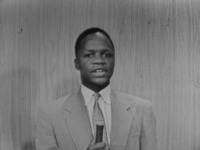
24 episodes, 1957, WTTW (Chicago)
From WNET:
"'America Looks Abroad' is divided into four sections: (1) six programs on Africa; (2) five programs on international organizations; (3) seven programs on the other Americas; and (4) six programs on the making of foreign policy. Individual program data on the last two sections will be forthcoming at a later date.
Once called the Dark Continent, Africa now is engulfed in a rising tide of national ism that is bringing new nations to the face of the earth, burgeoning old issues into fresh violence, and boding more troubles for the future. In Africa live 210 million people – black, brown and white, of European, Asian and jungle blood. It is a land of grinding poverty and of the world’s wealth of diamonds, gold and uranium. The six programs here offer the story of a continent which is still “dark” in terms of popular impressions about it. What happens to the peoples of Africa concerns Americans, too, and US policy as regards their nationalistic aspirations will crucially affect world opinion about this country. Included will be a pertinent program about the recent Suez troubles.
The next five programs discuss the success and failures of international organizations. Walls that separate nation from nation have served for all of history in the cause of war, of hatred and of violent rivalry. And for all of history, there have been men who have tried to pull down these walls. By treaty, by confederation, by union, by organization, these efforts have influenced the course of world affairs – exercises influence, sometimes evil, more often, beneficial. Leading authorities discuss important implications of the organizations and view them in perspective. “America Looks Abroad” was produced for the Center by WTTW, Chicago."
From Capitol Hill: party government and the United States Congress
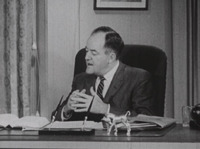
8 episodes, 1958, WYES (New Orleans)
From WNET:
"The purpose of this series is to examine and explain the purposes, processes, and problems of Congress; to analyze the formal and informal power structure in Congress; to investigate the role of political parties in the legislative process; and to investigate the effects of Congress on the character, organization, success, and failures of political parties. Advocates of party reform frequently ignore or misinterpret the direct relationship between the character of American parties and the character and composition of Congress. It is the purpose of this series to examine this relationship and determine why it exists, as well as to assess suggested reforms. Attention also will be accorded, where appropriate, to the roles and responsibility of the citizen in party affairs, and to the place of pressure groups in the political and legislative process, with the aim of presenting a complete, balanced description of the political process in Congress."
Hats in the ring
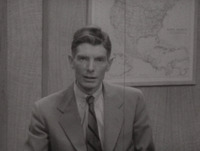
10 episodes, 1956, Johns Hopkins University
From WNET:
"This 10-part series is concerned not with election campaigns but with the intricate political processes that wind up with nominations in the two major parties. Featured as lecturer-guide is Malcolm Moos, professor of political science at Johns Hopkins University, who served on the team conducting a comprehensive study of the 1952 nominating conventions for the American Political Science Association. While the series is designed primarily to show how a candidate is nominated, it also will focus on the history of presidential nominations. Produced for the Center by Johns Hopkins University, over one hundred stills, maps and films are used in the series to dramatically illustrate American political processes."
Decision: the Constitution in action
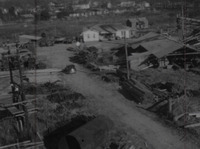
7 episodes, 1959, Steven Sharff Productions, Inc.
From WNET:
"Each program in the series deals with a US Supreme Court decision of recent history involving a question of constitutional interpretation. The cases are reenacted by many of the real-life people involved and filmed on location in communities across the nation to underscore the proposition that these have been issues affecting everyday people in the course of their normal lives. The series focuses on the stresses which the Constitution has undergone and the conflicting issues involved in interpreting this document. The programs were produced by the Center for Mass Communication of Columbia University Press. Herbert Wechsler, Columbia University Professor of Law and formerly Assistant Attorney General of the US, was consultant. Erik Barnouw, national chairman of the Writers Guild of America, was writer and executive producer for the series. Stephen Sharff, documentarian, winner of awards at Edinburgh and Venice Film Festivals, was producer-director."
Nationalism and colonialism
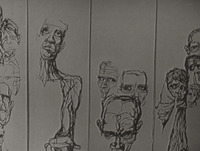
16-18 programs, 1960, META
From WNET:
"Perhaps the most dramatic event on the world stage today is the emergence of new nations from their former colonial status. This series sheds new light on this headline-making subject through films and interviews with persons who have governed and have been governed under colonialism. In addition to covering changing periods in colonial history throughout the world, the series concentrates on the crumbling colonial system in Africa from Capetown to the shores of the Mediterranean. Nationalism and colonialism are historically inseparable. Modern colonialism in its earliest forms was an outgrowth of nationalistic aims and ideologies; and in contemporary terms, nationalism may be described as largely a reaction to British, French and Belgian, Dutch and possibly even American colonialism. Nationalism and colonialism have in this way historically acted and reacted one upon the other, and are now shaping the major international conflicts of our time."
Twentieth century revolutions in world affairs
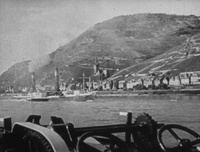
9 episodes, 1959, KRMA
From WNET:
"Vivid documentary film footage and dramatic re-enactments of historical events are the magic carpets transporting viewers from Germany to Japan and the Soviet Union and through ideological, philosophical and practical revolutions which have occurred in the past 59 years. Weapons, human expectations, colonialism, the United Nations, the United States and many geographic areas are examined in the light of what has transpired in the twentieth century. Leading this 9-week exploration is host C. Dale Fuller, vice president of the Foreign Policy Association."

